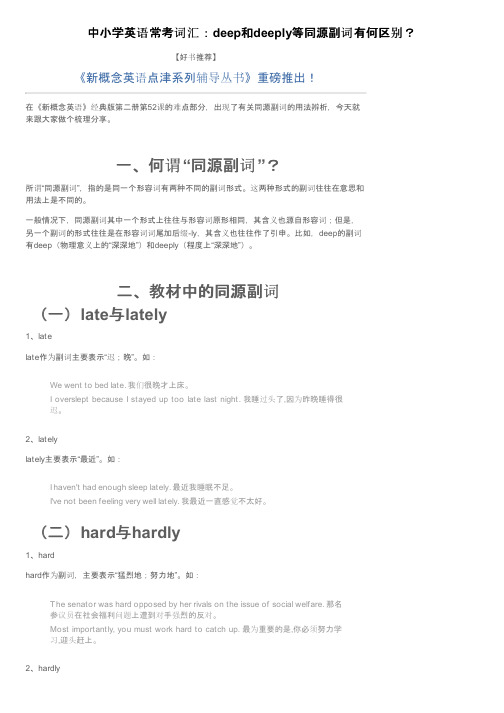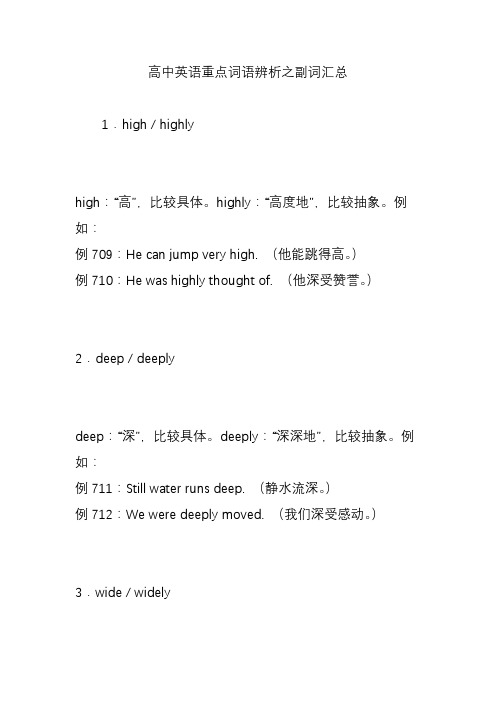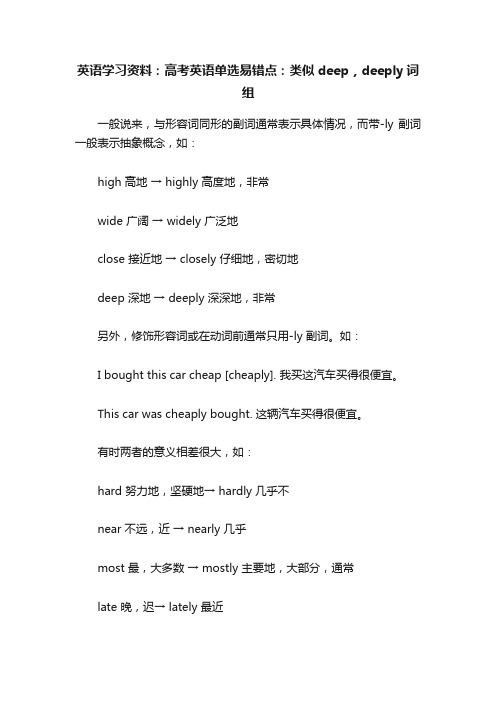副词deep和deeply区别
副词 deep 和 deeply 的区别

英语中,deep 和deeply 都有副词词性,意思是“深深地”,但这两个词的用法不同,我们来学习一下。
1. deep: 副词的意思是“在深处,深深地”,主要用于强调的是空间深度,不带有感情色彩。
例句1:The miners were trapped deep under the ground.
矿工们被困在地下深处。
例句2:He stood with his hands deep in his pockets.
他双手深插在衣袋里站着。
deep 有时也指抽象意义的“深”。
例句3:He gazed deep into her eyes.
他深深凝视着她的眼睛。
例句4:Mike learned English deep into the night.
麦克学习英语一直到深夜。
2. deeply: 这个词侧重表示感情上的“深”,是一个带有感情色彩的词。
例句5:Mary was deeply moved by the film.
玛丽被电影深深地打动了。
例句6:They were deeply disturbed by the accident.
这个事故使他们深感不安。
高频难词高考实用词组用法辨析

高考实用词组用法辨析1.Deeply和deep的区别Deeply adv.深They had to dig very deep(deeply)in order to find water. 他们必须掘得很深,才能发现水。
He pushed his stick deep(deeply)into the mud. 他把手杖使劲往泥里扎。
Plough deep /deeply the first time and less deep /deeply the second time. 第一次犁深些,第二次不要犁得那么深。
Thousands of British soldiers stood deep in the water. 数千名英军士兵站在水中。
They went on studying deep into the night. 他继续学习,直到深夜。
Romeo was deeply in love with Juliet. 罗密欧深深地爱上了朱丽叶。
I'm deeply sorry for what has happened. 我为发生的事感到非常遗憾。
特别提醒 deep也可作副词用,指动作或事物具体的"深",与deeply同义(常用来修饰动态动词),若指静止状态的"深",则用deep不用deeply(如stand deep);作"夜深"解用deep 不用deeply;用于抽象、喻义的"深"(如"深深地热爱"等)一般用deeply而不用deep。
2.Especially, specially和particularly的区别(1)especial为形容词,它的"特别"是不同于普通的,有"主要的","突出的"的意思。
其副词为especially,反义词为ordinary。
高考英语知识点 deep deeply的用法

高考英语知识点 deep deeply的用法
来源:互联网
英语是一门很讲究知识积累的科目,没有扎实的基础就很难考得高分。
为您搜集整理了2013年高考英语相关知识点,希望同学们能够认真看一看。
小编寄语:deep, deeply都可以看作是deep的副词,那么它们有什么区别呢?下面小编为大家提供2013高考英语知识点讲解:deep, deeply,供大家参考。
deep, deeply
deep 具体的深,例:dig deep
deeply 抽象的深,深深地,例:deeply moved
aloud, loud
aloud 出声地,例:read aloud 出声地读
loud 大声地
worth, worthy
二者均为值得,worth后接doing;
worthy后接to be done, of being done;
例:It is worth visiting. = It's worthy to be visited. = It's worthy of being visited.
bad, badly
bad 形容词,例:go bad
badly 副词,不好,但与need, want, require连用为“很,非常”,例:I need the book badly.
before long, long before
before long 不久以后;
long before 很久以前;
例:not long before = before long。
2020-2021学年牛津版版英语六年级下册核心词汇辨析与解析(十八)

核心词汇辨析与解析(十八)deep英音:/di:p/美音:/dip/英汉1.adj.深的2.位于深处的, 纵深的3.深色的, 浓重的4.声音低沉的5.强烈的, 极度的, 深厚的6.严重的, 深厚的7.理解深刻的8.深奥的, 神秘的9.adv.深入地, 深深地10.到很晚比较级: deeper, deepest副词: deeply名词: deepness近义词近义词:[n.] middle, natural depression, depression, ocean[adj.] heavy, profound, sound, wakeless, abysmal, abyssal, unfathomable核心词汇辨析与解析反义词:[n.] shallow, superficial, close, mild, high, high-pitched, colorless解析:deep: 普通用词,指由上到下,或由表及里的深度,可指具体或抽象事物。
profound: 语气较强,较为庄重,多指抽象的事物,多用于比喻。
词组| 习惯用语deepest adj. 最深的,最深deeper adj. 更深deep zone深层deep pool深水池mindanao deep深不可测;棉兰老深渊(位于菲律宾西部的太平洋地区)deep thought n. 沉思;冥想deep love深深的爱;深沉的爱deep penetration深穿透deep ball深球;长球go deep进入深处网络短语:deeps深海; 深处;核心词汇辨析与解析Deeper更深; 越陷越深; 越深; 深度;Deepest最深处; 最深的; 深的; 纵深的;deep deep breath失焦deep deep freeze冰点还原精灵; 冰点还原;Deep Deep Down流行朋克deep purple deep purple井上雄彦T Deep deep down太空摇滚faronics deep deep freeze使用手记bangellian deeps本戈里深渊英语例句库1.Elizabeth despised Ann's house-proudness as deeply suburban.1.伊丽莎白厌恶安对自己家庭的夸耀,认为那很俗气。
中小学英语常考词汇:deep和deeply等同源副词有何区别?

中小学英语常考词汇:deep和deeply等同源副词有何区别?【好书推荐】《新概念英语点津系列辅导丛书》重磅推出!在《新概念英语》经典版第二册第52课的难点部分,出现了有关同源副词的用法辨析,今天就来跟大家做个梳理分享。
一、何谓“同源副词”?所谓“同源副词”,指的是同一个形容词有两种不同的副词形式。
这两种形式的副词往往在意思和用法上是不同的。
一般情况下,同源副词其中一个形式上往往与形容词原形相同,其含义也源自形容词;但是,另一个副词的形式往往是在形容词词尾加后缀-ly,其含义也往往作了引申。
比如,deep的副词有deep(物理意义上的“深深地”)和deeply(程度上“深深地”)。
二、教材中的同源副词(一)late与lately1、latelate作为副词主要表示“迟;晚”。
如:We went to bed late. 我们很晚才上床。
I overslept because I stayed up too late last night. 我睡过头了,因为昨晚睡得很迟。
2、latelylately主要表示“最近”。
如:I haven't had enough sleep lately. 最近我睡眠不足。
I've not been feeling very well lately. 我最近一直感觉不太好。
(二)hard与hardly1、hardhard作为副词,主要表示“猛烈地;努力地”。
如:T he senator was hard opposed by her rivals on the issue of social welfare. 那名参议员在社会福利问题上遭到对手强烈的反对。
Most importantly, you must work hard to catch up. 最为重要的是,你必须努力学习,迎头赶上。
2、hardlyhardly在意思上与形容词hard已经没有什么关联了,主要表示“几乎不;简直不”。
高中英语重点词语辨析之副词汇总

高中英语重点词语辨析之副词汇总1.high / highlyhigh:“高”,比较具体。
highly:“高度地”,比较抽象。
例如:例709:He can jump very high. (他能跳得高。
)例710:He was highly thought of. (他深受赞誉。
)2.deep / deeplydeep:“深”,比较具体。
deeply:“深深地”,比较抽象。
例如:例711:Still water runs deep. (静水流深。
)例712:We were deeply moved. (我们深受感动。
)3.wide / widelywide:宽,大。
widely:广泛地。
例如:例713:The fox lay dead, with its mouth wide open. (张大嘴巴)例714:The Chinese language is widely used. (广泛使用)4.late / latelylate:晚,迟。
lately:最近。
例如:例715:He came home late last night.例716:Have you heard from him lately?5.hard / hardlyhard:努力。
hardly:几乎不。
例如:例717:Work hard, and you’ll succeed.例718:We can hardly imagine that.6.near / nearlynear:在附近。
nearly:几乎。
例如:例719:I live near.(我住在附近。
)例720:Nearly 1,000 people were trapped in the fire. (将近有一千人被困大火中。
)7.close / closelyclose:靠近。
closely:紧紧地,密切地。
例如:例721:Come close to me. (请靠近我。
初中英语副词知识点

初中英语副词知识点副词(Adverb 简称adv.)是指在句子中表示行为或状态特征的词,用以修饰动词、形容词、其他副词或全句,表示时间、地点、程度、方式等概念。
下面小编给大家分享一些初中英语副词知识,希望能够帮助大家,欢迎阅读!初中英语副词知识1副词的比较级副词和形容词一样,也有它的比较级和最高级形式. 可以参考形容词的变换形式。
但以词尾 -ly 结尾的副词(除 early )须用 more 和 most 。
单音节副词的比较级是在副词后面加上-er 构成的,最高级是在副词后面加上 -est 构成的。
near nearer nearesthard harder hardest多音节副词的比较级是在副词的前面加上 -more 构成的。
最高级是在副词前面加上 -most 构成的。
有些副词的比较级和最高级形式是不规则的。
well-better - best little - less - leastMuch- more - most badly - worse - worstfar-farther(further)-farthest(furthest)副词的比较级和最高级用法同形容词的比较级用法基本一样。
最高级形式句中 the 可以省略。
He works harder than I.他比我工作努力。
Lucy gets up earlier than Lili.露西比丽丽起床早。
He runs fastest in our class.他在我们班跑地最快。
He dives deeper than his teammates.他比他的队员潜水深。
It's true that he speak English more fluently than any of us.他英语讲的确实比我们任何人都好。
Our school team play football best in our region.我们校队在我们地区足球踢得最好的。
英语学习资料:高考英语单选易错点:类似deep,deeply词组

英语学习资料:高考英语单选易错点:类似deep,deeply词
组
一般说来,与形容词同形的副词通常表示具体情况,而带-ly 副词一般表示抽象概念,如:
high 高地→ highly 高度地,非常
wide 广阔→ widely 广泛地
close 接近地→ closely 仔细地,密切地
deep 深地→ deeply 深深地,非常
另外,修饰形容词或在动词前通常只用-ly 副词。
如:
I bought this car cheap [cheaply]. 我买这汽车买得很便宜。
This car was cheaply bought. 这辆汽车买得很便宜。
有时两者的意义相差很大,如:
hard 努力地,坚硬地→ hardly 几乎不
near 不远,近→ nearly 几乎
most 最,大多数→ mostly 主要地,大部分,通常
late 晚,迟→ lately 最近
free 免费地,松动地→ free 自由地,随便地,无限制地某些固定表达是否带-ly 视习惯而定。
如:
deep in thought 沉思 deep into the night 深夜
take it easy 别急 easy e, easy go 易得则易失
sound asleep 熟睡 wide open 完全开着
wide awake 完全醒着。
- 1、下载文档前请自行甄别文档内容的完整性,平台不提供额外的编辑、内容补充、找答案等附加服务。
- 2、"仅部分预览"的文档,不可在线预览部分如存在完整性等问题,可反馈申请退款(可完整预览的文档不适用该条件!)。
- 3、如文档侵犯您的权益,请联系客服反馈,我们会尽快为您处理(人工客服工作时间:9:00-18:30)。
副词 deep与deeply的用法区别
两者均可用作副词,表示“深”“深深地”,区别如下:
1. 修饰具体的动作, 两者常可互换。
如:
The doctor asked me to breathe deep [deeply]. 医生叫我做深呼吸。
We had to dig deep [deeply] in order to find water. 为了找到水,我们只好深挖。
2. 修饰静止状态或介词短语,表示深夜或用于复合词中等,通常用 deep。
如:
He sat there deep in thought. 他坐在那儿深思。
The meeting continued deep into the night. 会议一直开到深夜。
For some people, smoking is a deep-rooted habit. 对某些人来说,抽烟是一个根深蒂固的习惯。
静止状态或介词短语有时也有用 deeply 修饰的,但很少见。
如:
Karen and Dave are deeply in love with each other. 凯伦与戴夫俩人深深地相爱着。
3. 修饰带有感情色彩的动词(如 hate, dislike, love, admire, hurt, regret 等),通常要用 deeply。
如:
He deeply hates fish. 他很不喜欢吃鱼。
We deeply regret your misfortune. 我们对你的不幸深表遗憾。
但有趣的是,deeply 虽可修饰 love, dislike,但它却通常不能修饰表示类似含义的 like 和 prefer。
4. 修饰形容词、过去分词等,一般要用 deeply。
如:
I am deeply grateful to you. 我衷心感谢你。
He was deeply moved by [at] the story. 听了这个故事,他深受感动。
